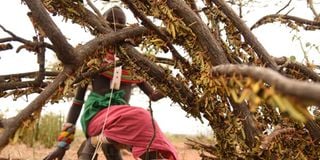Drones deployed to fight locusts in Samburu as farms ravaged

Murdane Nai at Nguaruny in Samburu East curiously observes young locusts. Millions of the voracious insects have swept across East Africa.
What you need to know:
- Special Programmes Chief Officer Daniel Lesaigor noted that they had started using specially developed drones to kill the pests.
- The swarms that landed in Porro and Ndoto have left behind a trail of destruction.
The introduction of special drones could boost the fight against the pests in Samburu because difficult terrains in the region were challenging ground spray efforts.
Disaster response teams in Samburu have started using drones equipped with mapping sensors to spray desert locusts that are ravaging crops and pasturelands in the region.
Millions of the voracious insects have swept across East Africa in what the United Nations Food and Agricultural Organisation (FAO) has termed as the worst outbreak in a quarter of a century.
The second generation of the pests is threatening to increase food shortages in Samburu, a region where up to 130,000 people have been reeling from persistent droughts and floods for years.
Special Programmes Chief Officer Daniel Lesaigor noted that they had started using specially developed drones to kill the pests.
"The programme is cheaper. This is the first experience because nobody has ever done this with desert locusts before. The sprayers are effective because we spray the locusts upon sighting them," said Mr Lesaigor.
Trail of destruction
The swarms that landed in Porro and Ndoto have left behind a trail of destruction.
According to FAO, a locust swarm of a square kilometre can eat the same amount of food in one day as about 35,000 people.
The introduction of special drones could boost the fight against the pests in Samburu because difficult terrains in the region were challenging ground spray efforts.
"This is a major boost because most places are not accessible due to bad terrain. With these drones, we are able to send them and do spraying exercise conveniently," said Mr Lesaigor.
He noted that the government has intensified surveillance to trace and eradicate the pests.
The officer noted that they have trained 10 people as part of action plan to boost surveillance.
Mr Lesaigor noted that most swarms spotted in the region are about to mature and could start breeding if torrential rains begin falling.
Fresh swarms
If the FAO's latest reports are anything to go by, the situation is expected to worsen in the coming weeks.
The UN agency is projecting that new swarms of desert locusts could start arriving in Kenya in December because of new breeding in neighbouring countries of Ethiopia and Somalia.
Fresh swarms are likely to move in to the Northern Kenya.
Kenya could suffer the worst locust invasion in 70 years, threatening food security.
The report further says egg-laying and hatching are in progress, while hoppers are forming bands.
"As a result of the ongoing breeding, a new generation of immature swarms will form in early December. They are expected to move south and threaten southeast Ethiopia, southern Somalia, and northeast Kenya," read the report dated November 2.
In Samburu, the pests have destroyed crops and grazing vegetation covers.
In arid and semi-arid areas, the insects also push herders to non-traditional grazing lands, sometimes leading to violent clashes with farmers.
Mr Elias Leakono, 36, recounted watching massive desert locusts moving in vast cloud-like swarms and darkening the sky, something he said he had never witnessed before.
The insects invaded his farm and left a trail of destruction.
"This is a huge disaster. I have never seen anything like this before. They consumed everything. All vegetation was gone and livestock had nothing to eat,” said Mr Leakono.
Harsh chemicals
The pastoralist said three of his cows died mysteriously last month, a scenario he linked to the harsh chemicals used for aerial spraying of desert locusts in Angata Nanykie area.
He noted that he had been forced to move his remaining herds to his neighbour's homestead.
Ms Elizabeth Lesegwe expressed fears that the insects may wipe her entire vegetable and maize farm if not controlled.
“We thought the government would contain them earlier enough. Our crops are not safe at all. If the locusts destroy the crops, my family will be in trouble," Ms Lesegwe told the Nation.
She asked the national and county governments to eradicate the desert locusts that have camped in the region before they cause more harm to crops.
“We have not seen any progress by the government in combating the locusts. We are facing hunger amid the coronavirus pandemic," she said.





